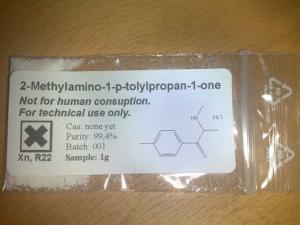Drug War Issues
Politics & Advocacy
The European Commission, the executive body of the European Union (EU), called for an EU-wide ban on the synthetic drug mephedrone last week, describing it as "dangerous psychoactive substance," but based that call on scanty evidence. The stimulant drug, with effects likened to those of cocaine and ecstasy, is already illegal in 15 EU countries, but remains available in 12 more.

mephedrone sample (photo from mephedrone.org)
"It is a dangerous drug that is available online and on the street corner. People have died because of this drug, so I urge governments to move fast to control and criminalize it," said justice commissioner Viviane Reding in a Wednesday statement. "We have a responsibility to protect young people against dangerous new psychoactive substances."
The commission claimed that mephedrone "has been linked to at least 37 deaths in the UK and Ireland alone" and acted in an emergency manner because of a mephedrone risk assessment report published last week by the European Monitoring Center on Drugs and Alcohol (EMCDDA). The commission added that the report "showed that mephedrone can cause acute health problems and lead to dependency."
But the report itself says that no direct causal link can yet be made between mephedrone and the reported deaths. "There have been a very limited number of deaths reported to be related directly to the use of mephedrone," the EMCDDA report said.
There are only two in which mephedrone appears to be the sole cause of death. Of the other 35 reported deaths, the EMCDDA report noted, "In some of these cases it is likely that other drugs and/or other medical conditions or trauma may have contributed to or been responsible for death. The inquests into the deaths are pending for the majority of these cases therefore it is not possible at this time to determine the contribution of mephedrone."
The evidence base for assessing mephedrone is weak, the report found. "The studies available on mephedrone are few, largely preliminary and focused on user self-reports. To date no epidemiological data on prevalence has been published. The majority of studies originate from the United Kingdom and evidence from other member states is scarce."
As a result, EMCDDA warned against a rush to judgment about mephedrone's danger. "Taken as a whole, the scientific evidence base available for drawing conclusions is limited and this proviso should be borne in mind when interpreting the findings of the risk assessment exercise," the report said.
But that, of course, is what the EU has done with its call for a union-wide ban on the new club drug. That didn't sit well with former British Advisory Council on the Misuse of Drugs head David Nutt, who was fired for criticizing the government there as "politically motivated rather than scientifically justified" for rescheduling cannabis to a more serious schedule.
"An EU-wide ban on mephedrone is remarkable for its lack of scientific evidence," Nutt told EUobserver. "The report primarily relies on user experiences and a handful of hospital admissions, with no formal studies to demonstrate the actual or potential harms of the drug. It is not yet possible to say how harmful mephedrone is given the lack of evidence. However, by legislating on a substance without reliable scientifically-based evidence, we run the risk of causing more harm through criminalizing users than might be caused by the drug itself. The evidence on drug harms should not be sacrificed for political and media pressure."
Permission to Reprint: This content is licensed under a modified Creative Commons Attribution license. Content of a purely educational nature in Drug War Chronicle appear courtesy of DRCNet Foundation, unless otherwise noted.
Add new comment